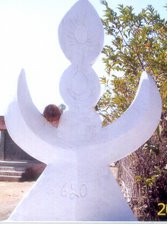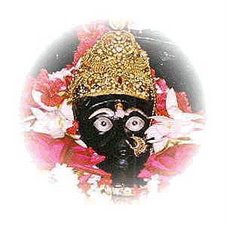'Bhumkaal Ta Pollo' A local radio initiative in Chhattisgarh
Posted by: "Frederick Noronha" fredericknoronha@gmail.com fredericknoronha
Fri May 25, 2007 6:12 pm (PST)
http://charkha. org/newsletter/ radio_Gondi. htm
'Bhumkaal Ta Pollo' A local radio initiative in ChhattisgarhSujata RaghavanRadio as a medium for communication has found new enthusiasts amongsta group of twelve social activists in Kanker district in southChhattisgarh. Drawn from areas of Charama, Amabeda and Kanker blocks,what was striking was that this youthful group had no previousbackground in radio production or broadcast . What they did have inabundance was enthusiasm and the belief in the power of radio toreflect their voices over a large audience. This was the key thattransformed the group into a team of radio producers who over a fiveday intensive workshop organized by Charkha learnt and practiced themultiple techniques and skills for creating a full-fledged radioprogramme.PARTICIPANTS RECORDING A TRIBAL SONG ACCOMPANIED BY CUSTOMISEDMUSICTitled 'Bhumkaal Ta Pollo' which means "News of the Community',this 20 minute programme in the local dialect, Gondi, in a magazineformat was literally a slice of life in the region. Consisting ofindividual profiles, success stories, development issues, currentevents, places of interest and music and the arts of the region, itwas a peep into a world which is often left out of mainstream mediaand does not make it to the information world out there. 'Bhumkaal TaPollo' was broadcast by All India Radio, Jagdalpur station in itsprogramme for rural audiences "Amcho Gaon" on two Sundays a fortnightapart, in April and May 2007. This was literally the crowning gloryfor the efforts of the team which made this happen.What happened in the few days in March was the result of a longcherished dream by Charkha to ultimately make Radio a viable tool forcommunities to use independently for self-expression, discussion,articulation and communication both within their region and with theworld beyond.
Within the existing laws that govern the control ofairwaves in India this seemed remote almost impossible. With All IndiaRadio firmly in the saddle, 'Community Radio, strictly speaking, was afar cry. Yet what was possible is to use the existing airwaves andbuild capabilities of rural communities to access them forhighlighting their issues, aspirations and grievances.This dream is what drove this particular initiative in Chhattisgarhwhere the challenge has been to use a medium to reflect the diversity,richness, cultural and social highlights and core development issuesof a tribal society often hidden from the world outside.
Teaming up with a local NGO Disha Samaj Sevi Sanstha, the first stepwas to conduct an audience research in these areas to establishprofiles of the listeners, programme preferences and timings and theinterest of community in participating in a local Radio initiative.The five day residential workshop between 23rd –29 March 2007 took thegroup through integrated sessions of script-writing, sound-recording,editing, and presentation of radio programmes.
PARTICIPANTS GET FAMILIAR WITH THE RECORDING EQUIPMENT
For thoseconducting the process was like walking a tightrope, a delicatebalance between pushing the group too hard to quickly absorb theskills and knowledge and on the other hand setting a pace and tonewhich would allow them to naturally imbibe and learn in a slow andsteady manner. Most of the participants were totally familiar with theradio having listened over long years and shared an almost intimaterapport with their favorite programmes .
Yet they were completely atsea with the techniques, production stages, nuances and themind-boggling extent of inputs required to create one radio programme.According to Raijuram Mandavi , he had no idea that programmes arerecorded separately, then mixed or put together sequentially oredited. He had a feeling it all happened automatically. RaimottinMarkam also was astounded by the extent of careful editing, thesensitivity to tone, manner, expression and voice modulation required.There were moments of high frustration and tension during theworkshop. The group had to work with simple sound recorders to get ahands-on experience. In the initial sessions, Sukai Usendi could notbring herself to press the red button to record while she talkedlooking at it as if it would explode! Manglu Ram, while conducting amock interview with a farmer, started off with a well-framed questionon the agricultural produce. Then he suddenly got cold feet glancingfurtively around for support, lapsing into his local dialect (insteadof Hindi) and was literally whispering into the recorder half bits ofthe next few questions.On the other hand there was a spectacular mock interview again byShanti Sodia speaking to the first girl from her village who completedher education till the M.A level. The questions were clear, relevantand drew out the emotion and excitement of achieving this.This capability was evident during the field visits to nearbyvillages, Iradaha and Marda Poti. Working in two groups guided bytheir team leaders who also were the main commentators, the teamconducted interviews with the sarpanch, the head of the mahila mandal,a social activist working on disability issues and an elderly man.They also recorded sounds of the village, local songs.
Through gesticulations, sign languages, recording and re-recording the teampulled it off and did by all accounts a great job!At the editing studio at Raipur, they could get a sense of theirrecorded material as being the first step or the 'raw material' forthe final radio programme. Their expressions of wonder, awe, delightand sheer embarrassment at having heard their own voices in a studiodisplayed the range of emotions they may have experienced over thefive days.
What was heartening is that they could see the flaws intheir own recording and were viewing it from a new found objectivityand standard.In all of this, the main resource person, Vibhash Jha, journalist andbroadcaster based in Raipur, laid the foundation of the Radio mediumwith its numerous possibilities for reflecting the diversity andbeauty of local life patterns, songs, stories and social concernsWithin this he wove together key information about the media,anecdotes from his varied experience and slowly worked to createconfidence and self-expression amongst the group. Mirza Masood aneminent broadcaster and playwright brought out the uniquecharacteristics of medium, the importance of grasping its coreprinciples and the immense opportunities for creating programmes ofquality, authenticity and value to the community.It has been a long journey within a compressed time-frame for this rawtalent pool to evolve into a radio team.
This journey will continuegetting better as it goes. For Charkha it was like lighting a lamp,kindling a spirit and then allowing the abundant talent from thegrassroots to flow and find its own momentum and create its own placewithin the community and the world beyond.
(Charkha Features)-- FN M: 0091 9822122436 P: +91-832-240- 9490 (after 1300IST)Skype: fredericknoronha Yahoochat: fredericknoronhahttp://fn.goa- india.org http://fredericknor onha.wordpress. comEmail fred at bytesforall. org Res: 784 Saligao 403511 Goa India
Subscribe to:
Post Comments (Atom)







No comments:
Post a Comment